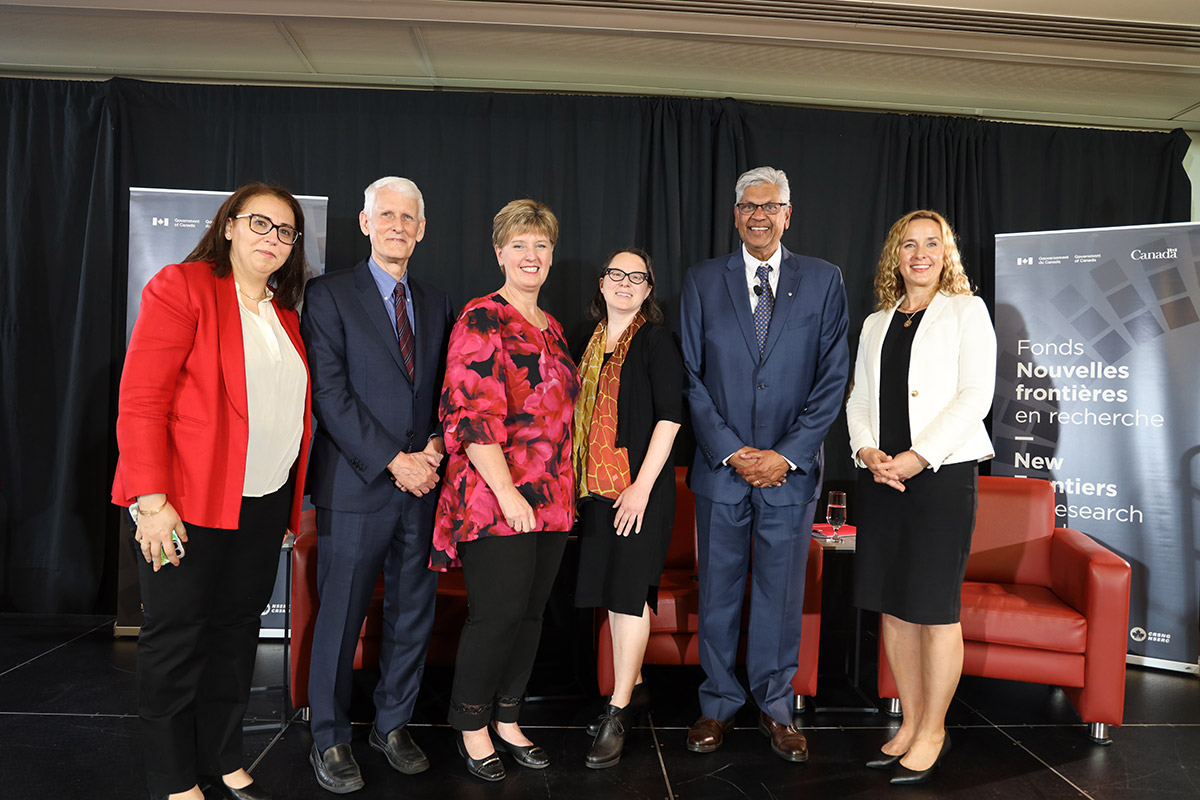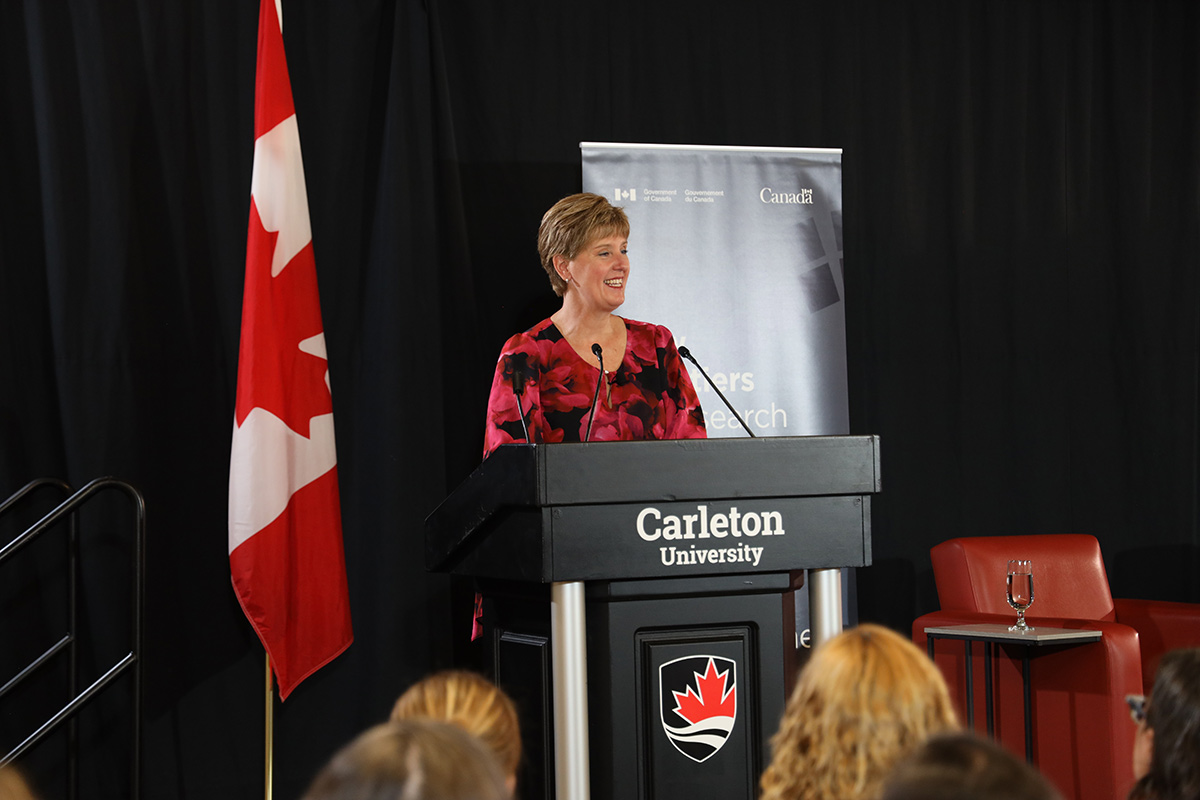Three Carleton University researchers received a combined $2 million from the federal government’s New Frontiers in Research Fund (NFRF) today to support multidisciplinary projects exploring how gut microbes can break down ‘forever chemicals’; tracing the earliest signatures of life on Earth; and foregrounding the voices of the precariously housed for equitable and transformational climate adaptation.
The funding was awarded through two NFRF streams: Exploration and the 2023 International Joint Initiative for Research in Climate Change Adaptation and Mitigation. The Exploration stream supports projects that bring disciplines together beyond traditional disciplinary or common interdisciplinary approaches by research teams with the capacity to explore something new with the potential for significant impact. The International stream emphasizes engagement with vulnerable groups who are disproportionately impacted by climate change.

From left to right: Prof. Salwa Karboune (McGill), Interim President and Vice-Chancellor Jerry Tomberlin (Carleton), the Honourable Marie-Claude Bibeau (Minister of National Revenue), Prof. Elisabeth Gilmore (Carleton), Prof. Chandra Madramootoo (McGill), Assoc. Vice-President Valerie Laflamme (SSHRC) (Photo by Brenna Mackay)
Amy Rand: Exploring How Gut Microbes Can Break Down ‘Forever Chemicals’
Amy Rand and Daniel Grégoire, assistant professors in the Department of Chemistry, will use their NFRF to study the potential of the gut microbiome in breaking down per- and polyfluoroalkyl substances (PFAS). Due to intensive use and environmental contamination, most people have PFAS in their blood, which can’t be expelled or dissolved. Known carcinogens, these forever chemicals are found in everyday cleaning products, water-resistant fabrics, umbrellas, tents and grease-resistant paper. Using bacteria found in the human gut, Rand’s team is looking into its ability to perform chemical reactions to eradicate these cancer-causing agents.
Hanika Rizo: Tracing Early Life on Earth Using Tungsten Biosignatures
Earth Sciences researcher Hanika Rizo, together with a multidisciplinary group, seek to improve our understanding of how life began, where it came from and under what conditions it spawned. The NFRF project objective is to investigate how the most ancient microorganisms might have used tungsten, an extremely dense metal, for their metabolic growth. They will study extremophile organisms that are found in deep ocean hydrothermal vents, areas that are potentially the same environments where life on Earth originated. If early life on Earth utilized tungsten, it stands to reason that early extraterrestrial life forms might follow similar pathways. Understanding the fundamentals will help with planning future life-detection missions to icy-moons and other space destinations and offer insight into longstanding scientific and philosophical debates regarding the emergence of life on Earth.
Elisabeth Gilmore: Equitable Climate Adaptation Pathways for the Precariously Housed
A Carleton project led by Environmental Engineering and Public Policy researcher Elisabeth Gilmore has been funded by the International Joint Initiative for Research in Climate Change Adaptation and Mitigation. This initiative addresses the underlying development patterns and inequities that make people, and disproportionally make marginalised people, more vulnerable to the impacts and risks of climate change. Gilmore and her research team in Canada, U.K., South Africa and Nepal are working with communities and local governments, including in partnership with the Inuit Niqivut Silalu Asijjipalliajuq project team.
More people will be on the move as extreme weather due to climate change threatens lives, destroys property and ruins livelihoods. However, others may choose to stay and adapt to the changing climate. Gilmore’s project focuses on what a desirable future home and neighbourhood would look like from the perspective of those who are making decisions on how to use human mobility/migration in the face of climate risks and for the communities that host them. This project will explore how to weave the information from the precariously housed into processes, metrics and indicators that governments use for planning and infrastructure development – providing novel entry points for policymakers to carry out transformational projects that address underlying poverty and inequality.

Minister Marie-Claude Bibeau announces funding for three Carleton researchers from the federal government’s New Frontiers in Research Fund (NFRF). (Photo by Brenna Mackay)
This event was streamed live and can be found here: https://www.youtube.com/watch?v=0tS15zx4RO4
About the New Frontiers in Research Fund (NFRF)
The New Frontiers in Research Fund (NFRF) supports world-leading interdisciplinary, international, high-risk / high-reward, transformative and rapid-response Canadian-led research.
The NFRF program is under the strategic direction of the Canada Research Coordinating Committee and managed by the Tri-agency Institutional Programs Secretariat (TIPS), which is housed at the Social Sciences and Humanities Research Council (SSHRC), on behalf of Canada’s three federal research funding agencies—the Canadian Institutes of Health Research, the Natural Sciences and Engineering Research Council and SSHRC.
Monday, June 3, 2024 in Campus News
Share: Twitter, Facebook



